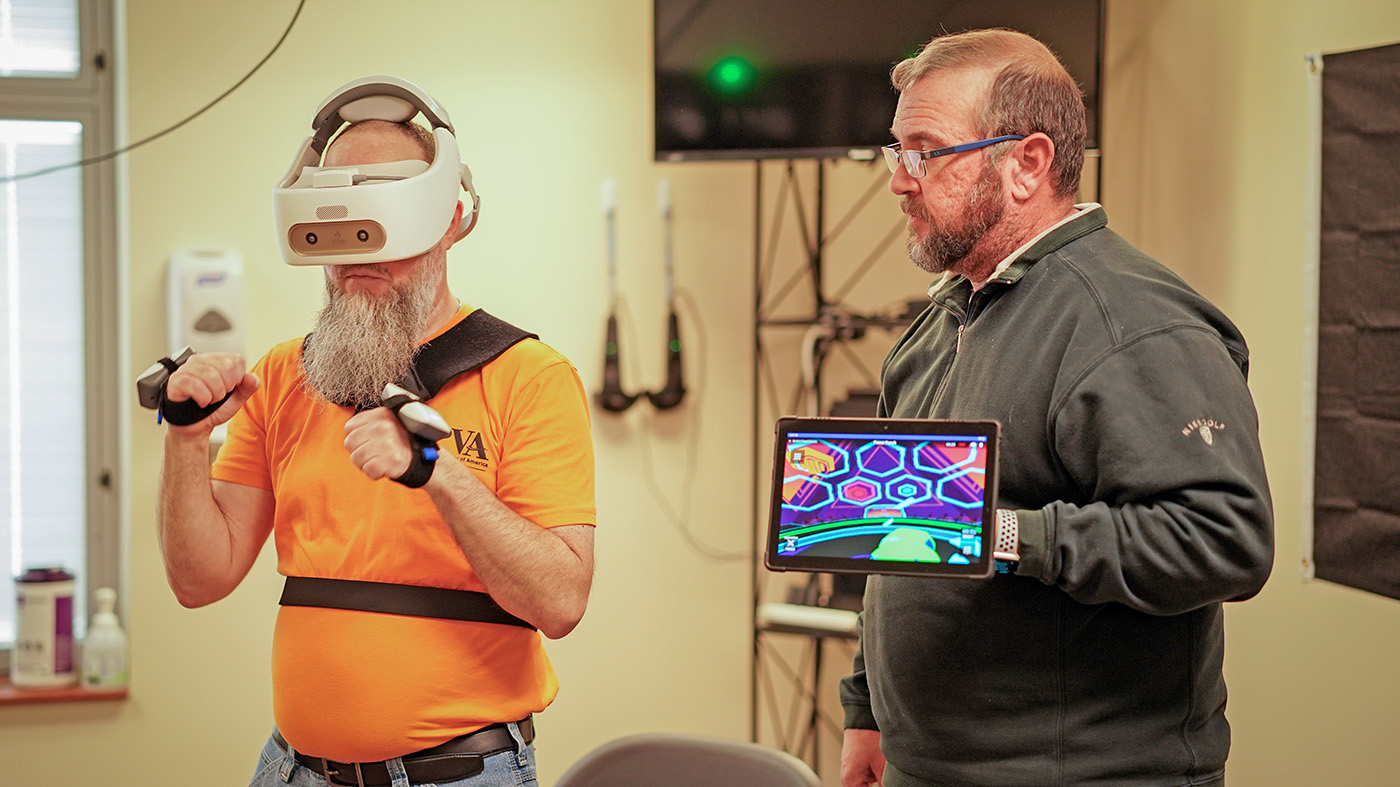Walking into the virtual reality clinic, the future of rehabilitation is on display at Central Iowa VA. It’s very different from other methods of rehabilitative care and it looks, well, like videogame technology. While part of the appeal is that the activities are fun, they are highly developed tools rather than games.
David McAdon, physical therapist assistant, puts sensors on a Veteran who agreed to demonstrate how the program works and talk about his experience.
Veteran Jeff Cook (pictured above wearing headset) first heard about the VR program through Paralyzed Veterans of America and decided to try it as an option for helping with his multiple sclerosis. He joined the Iowa Army National Guard as a cannon crewmember and trained for field artillery.
With his military benefits, Cook attended Northwestern College in Orange City, Iowa, and received his degree in communications in 1996.
He would later be diagnosed with multiple sclerosis, a disease of the brain and spinal cord. The diagnosis would eventually mean that Cook could no longer work and would have to leave his IT position at Wells Fargo. “With my MS, I’ve had a slow, steady decline, so I’m not as active. When I first was diagnosed with MS, I could still run, and now I have to ride a trike that has battery assist,” he shared.
“I’m playing racquetball again.”
One of the main benefits of the VR system is that it allows him to safely exercise and regain mobility, even now as he struggles with balance and is considered a fall risk. It also allows him to enjoy activities that he once thought had been lost to him.
“I played racquetball in college, and I tried playing it a couple years after I was diagnosed with MS but couldn’t do it. I kept running into the wall. It wasn’t safe for me, so I just had to accept that this sport is gone. Well, through the use of VR, I’m playing racquetball again,” he said.
There are a variety of experiences and activities available in the VR program. It allows Veterans to work on their physical and mental health issues as well as being adaptable to individual needs.
“If I don’t want to exercise or I’m too tired, I can just go a different route and do meditation—or combine the two, meditative at one point, then get a little exercise in. When I have really bad MS fatigue, we can use the pinball activity to get an excellent upper body workout. It’s not until I get home that I feel how great of a workout it really is. While doing VR, you really get into the moment which is really neat.”
VR programs allow the user to challenge themselves
Cook likes to play video games, so the VR programs are fun for him. They even allow the user to test their limits and challenge themselves.
“There was one activity. I’m 10 stories up and there’s a skyscraper and plank. You’re able to walk out to a plank and face your fear of heights. Dave’s always around you letting you know he’s there and you’re safe. As I was walking out onto the plank, my fear of heights kicked in and you could feel the wind pushing you side to side, see the birds flying around you… there’s a helicopter that flies over. It’s so realistic. To see all that and be out there, it’s really surreal how you can get so immersed into that environment,” he said.
The VR program also tracks and analyses metrics from each session, allowing the clinician to measure range of motion, perform assessments, and work on improving strength and imbalance, as well as providing data to aid in the clinical decision-making process.
“The possibility to improve Veteran care is exciting.”
McAdon explained the significant research and development that went into finding the right equipment and experiences for Veterans in the fast-changing world of VR technology. “We can treat a wide variety of Veterans using these VR devices. We have had many successes using VR with our Veterans that have to deal with anxiety, depression, pain, physical and functional limitations, and balance deficits on a daily basis. The new VR system and devices we have purchased allow our Veterans to improve their overall health and well-being in a safe, controlled environment while using virtual activities and experiences to work on the skills necessary to achieve their real-life functional and personal goals.”
Cook recommends the program for fellow Veterans. “Give it a fair shot,” he added.
“The use of VR and the benefits we are seeing when treating our Veterans seems to be only limited by our imagination,” said McAdon. “The possibility to improve Veteran care is exciting.”
Topics in this story
More Stories
Study underscores important role COVID vaccination can have in protecting Veterans from infection and reducing long-term health consequences
Columbia VA’s robotic surgery teams completed their 800th robotic surgery and are on schedule to hit 1,000 by the end of the year.
In a decentralized clinical trial, Veterans can participate from their own homes or local VA instead of having to travel to a research site.







VR is a great example of technology helping Veterans. I’m fortunate that my health issues are not physical limitations but for those that this will benefit, I’m happy it exists.